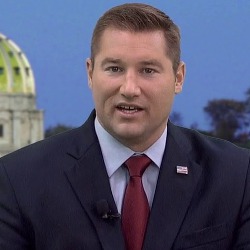Pennsylvania Considers Video Slots Expansion

Pennsylvania has been toying with the idea of loosening its gambling laws in order to make up for a shortfall in the state’s budget. One of the proposals that the Keystone State is currently considering is legalizing video gaming terminals outside of its licensed gambling establishments in order to generate extra revenues of $100 million in its first year of operation, rising to an estimated $500 million by year five.
Commenting on the issue, Sen. Guy Reschenthaler (photo), who has co-sponsored the Operator-Based Video Gaming Terminals House bill, stated: “These illegal machines exist in an unlicensed, unregulated, untaxed black market. We need to legalize this industry to bring it out of the shadows.”
Bi-Partisan Support
In late March, lawmakers in Pennsylvania shared details of their plan to expand video gaming terminals across the state. As an extract from the proposed legislation states, a range of other locations with liquor license should be considered suitable for these slot-like gambling machines, including “bars, restaurants, clubs, hotels and VFW’s.. truck stops and bowling centers.”
The plan was developed by both Republicans and Democrats, and is said to have broad support in both the House and Senate of the state legislature. Pennsylvania Governor Tom Wolfe’s office said the Governor would be willing to sign a bill to legalize video gaming terminals, provided that doing so would not detract from the state lottery or hurt the state’s casino industry.
Counter to Black Market
Lawmakers who are in favor of the plan to legalize video gaming terminals say that the state is already home to this type of gambling. The state estimates that there are more than 40,000 illegal video gaming terminals located in Pennsylvania that are providing revenues for bar and restaurant owners, while giving back nothing to their communities or their states by way of taxes. If the video gaming terminals law proves to be successful, licenses would be issued for around 40,000 machines to be located in bars, private clubs and similar businesses, which would then be taxed at a rate of between 29 and 34 percent of gross gaming revenues.
Only for Liquor License Businesses
Businesses that have liquor licenses would be able to offer a maximum of five machines on their premises, while other businesses, such as truck terminals and off-track betting parlors, could have up to 10. The largest bet that could then be placed at any one time would be $5, and winnings would be capped at $1,000. In addition, the law would require key employees at businesses receiving licenses to undergo training, and players would need to be at least 21 years of age to gamble.
Allaying Casino Concerns
This isn’t the first time that Pennsylvania has discussed video gaming terminals. Past attempts at regulating the terminals have been stymied by protests from the state’s casino operators, which fear that allowing people to play slots outside of casinos will detract from their revenues. To sweeten the deal for operators, Pennsylvania’s lawmakers have subsequently put language in the bill that would delay the licensing of new casinos and racinos, which would therefore cut down on competition among operators. So far, this proposal has been enough to get at least one of the state’s casino operators on board and lend its support to the bill.
Illinois Cited as Example
Supporters of the plan to legalize video gaming terminals point to Illinois as an example of what’s possible through this type of legislation. Since the state passed its own video gaming terminal law five years ago, Illinois has brought in more than $2 billion in tax revenues, including $330 million in 2016 alone. The statistics also indicate that allowing people to play video gaming terminals did not have a negative impact on the state’s lottery.
One area of concern, however, is that Pennsylvania’s 12 casinos may experience a drop in their monthly slots revenues. Penn National Gaming which operates three casinos in Illinois, for instance, reported an 8-10% fall in its revenues as a result of the legislation, but the company’s spokesman Eric Schippers says that the same trend is unlikely to be repeated in Pennsylvania due to its casino-friendly measures, which includes reducing the tax rate levied on slots.










